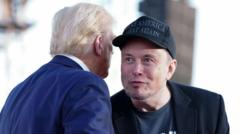
Elon Musk has been appointed to lead the Department of Government Efficiency (Doge) in the incoming Trump administration, alongside Vivek Ramaswamy. The role aims to dismantle government bureaucracy, reduce regulations, cut expenditures, and restructure federal agencies.
Musk has previously suggested the US government budget could be reduced by at least $2 trillion from its current $6.5 trillion, and has advocated for significant reductions in government employees. His approach to organizational management, demonstrated through his leadership of X (formerly Twitter) and other companies, provides insight into his potential governmental strategy.
When Musk acquired Twitter in a $44 billion deal, he implemented radical changes. He dramatically reduced the workforce from 8,000 to 1,500 employees, justifying the cuts by stating that “if the whole ship sinks, then nobody’s got a job.” He also relaxed content moderation policies, reinstated previously banned accounts like Donald Trump’s, and introduced a new monetization model for the platform.
Musk’s motivation for this role likely stems from frustrations with regulatory challenges in his existing businesses. At Tesla, he has resisted unionization efforts, arguing that unions can reduce productivity. With SpaceX, he has challenged regulatory bodies like the Federal Aviation Administration, accusing them of “regulatory overreach.”
The appointment appears to be a reward for Musk’s political loyalty. He donated approximately $200 million to Trump’s 2024 presidential campaign and has been a vocal supporter. Thomas Gift, a University College London politics professor, notes that Trump is surrounding himself with loyalists, and Musk has been particularly supportive.
While Musk cannot become president himself due to not being a natural-born citizen, this role provides him significant potential influence over government policy. He has already been involved in high-level discussions, such as being part of a call between Trump and Ukrainian President Volodymyr Zelensky.
Musk’s approach to government efficiency mirrors his business strategies: aggressive cost-cutting, reducing bureaucratic processes, and challenging existing structures. His involvement in the Department of Government Efficiency could potentially reshape how federal agencies operate.
However, critics caution that Musk’s methods can have unintended consequences. His changes at X, for instance, led to issues with content moderation, advertiser exodus, and the proliferation of bot-generated content.
Despite potential personal business interests, Prof Gift suggests Musk is not solely motivated by regulatory advantages. He appears to be ideologically committed to the causes he supports, willing to take significant personal and political risks.
The appointment signals a potentially transformative approach to government administration, with Musk bringing his entrepreneurial efficiency mindset to federal operations under a potential Trump administration.








